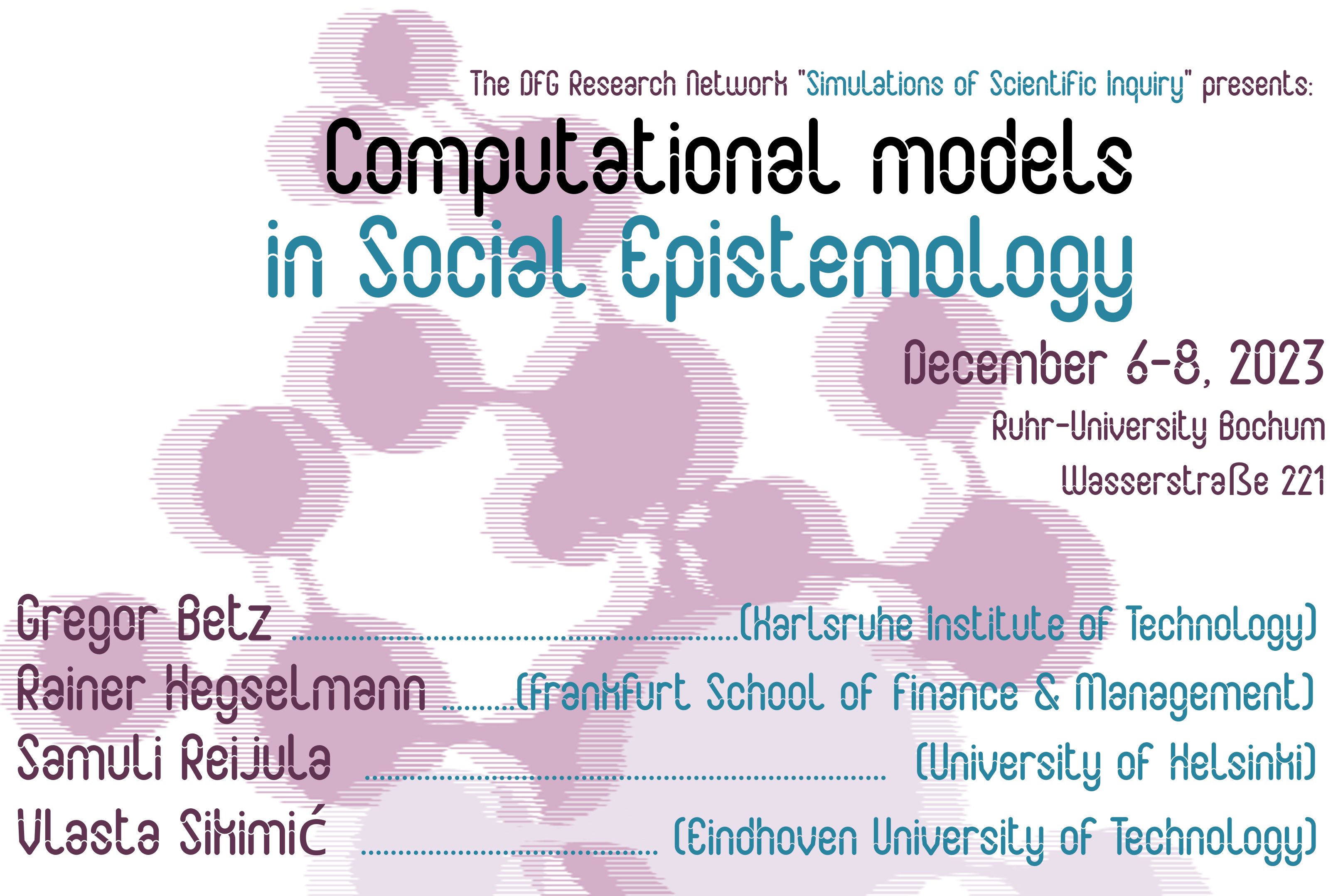Workshop on Computational Models in Social Epistemology (2023)
Table of Contents
This is the homepage of the Workshop on Computational Models in Social Epistemology, the second workshop of the DFG Research Network “Simulations of Scientific Inquiry”.

When and Where?
- When
- December 6-8, 2023
- Where
- Ruhr University Bochum, Wasserstraße 221 (4th floor, room 4/20); we welcome online attendance as well (please register to obtain the link)
Keynote speakers
Epistemology of Models and Simulations
- Wybo Houkes (Eindhoven University of Technology)
- Paul Hoyningen-Huene (Leibniz University Hannover)
Computational Models of Epistemic Communities
- Gregor Betz (Karlsruhe Institute of Technology)
- Ulrike Hahn (Birbeck University of London)
- Rainer Hegselmann (Frankfurt School of Finance & Management)
- Samuli Reijula (University of Helsinki)
Program Committee
- Dominik Klein (Utrecht University)
- Carlo Martini (Università Vita-Salute San Raffaele / University of Helsinki)
- Christoph Merdes (Friedrich-Alexander University of Erlangen)
- Aydin Mohseni (University of Pennsylvania)
- Hannah Rubin (University of Missouri)
- Jingyi Wu (London School of Economics)
Organizing Committee
Workshop chairs
- Matteo Michelini (TU Eindhoven, Ruhr University Bochum)
- Dunja Šešelja (Ruhr University Bochum, TU Eindhoven)
- Soong Yoo (Ruhr University Bochum)
Local organizing committee
- Christiane Dahl
- Jessica Krumhus
- Lisa Michajlova
Call for Abstracts (closed)
Over the last decade computational models have become increasingly popular across philosophical disciplines: from ethics and political philosophy to philosophy of science and social epistemology. They have been used to investigate and support philosophical arguments, such as the evolution of social norms, emergence of cooperation, efficiency of scientific inquiry, etc. Within social epistemology and philosophy of science, computational models have contributed to the rapid growth of the field to tackle topics such as opinion dynamics in collective research, division of cognitive labor, social bubbles and networks of epistemic trust, argumentation strategies, etc.
This workshop aims to provide a forum for discussing frontier of research on computational models in philosophy, with the special focus on models of epistemic communities.
Relevant topics include, but are not limited to, the following:
- Models of deliberation
- Models for social, cognitive and theoretical diversity
- Models of disagreement, dissent and polarization
- Models of scientific inquiry
- Computational accounts of ‘wisdom of the crowds’, groupthink and expertise
- Modeling bias and ignorance in groups
- Modeling propaganda, misinformation, and fake news
- Epistemology of models and simulations
- New computational methods
Workshop Registration
- If you wish to attend in person, please register at https://forms.gle/6bwYxKGrB39GjP4D8 by November 1, 2023 (end of the day). If you wish to register after the deadline, please contact the organizers (CompModelsRub@gmail.com).
- If you wish to attend online, please register at https://ruhr-uni-bochum.zoom.us/meeting/register/u5Msc-iqpjsqEtRQqhP-vMMvuSkJiFkSllog
Program
Click on the for a short abstract.
Day 1 (Wed, Dec 6th)
| Time | Event |
|---|---|
| 13:45-14:00 | Registration |
| 14:00-15:00 | [Keynote 1] Wybo Houkes (Eindhoven University of Technology): A fragility of goodness? Robustness analysis in modelling practices |
| 15:00-15:30 | coffee break |
| 15:30-16:30 | [Keynote 2] Paul Hoyningen (Leibniz Universität Hannover): How do robust abstract economic models explain? |
| 16:30-17:00 | coffee break |
| 17:00-18:00 | [Keynote 3] Ulrike Hahn: Why we need NormAN: Normative Argument Exchange Across Networks |
Day 2 (Thu, Dec 7)
| Time | Event |
|---|---|
| 10:00-11:00 | [Keynote 4] Rainer Hegselmann (Frankfurt School of Finance & Management): Two-armed bandits versus Carnapian truth seekers and epistemic free riders with bounded confidence |
| 11:00-11:30 | coffee break |
| 11:30-12:05 | Kevin Zollman (Carnegie Mellon University): Reflections on Independence Thesis |
| 12:05-12:40 | Christoph Merdes (Friedrich-Alexander-University of Erlangen-Nürnberg): A Bayesian Analysis of Testimonial Injustice. Credibility Excess and Attention Deficits |
| 12:40-14:15 | Lunch break |
| 14:15-14:50 | Matthew Coates (University of California Irvine): Does it harm science to suppress evidence? |
| 14:50-15:25 | Rafael Fuchs (Ludwig-Maximilians-Universität München): Exchanging arguments and evidence - a bayesian argumentative agent-based model of scientific debates |
| 15:25-16:00 | Matteo Michelini (Ruhr-Universität Bochum): An Agent-Based Model of MySide Bias in Scientific Debates |
| 16:00-16:30 | coffee break |
| 16:30-17:05 | Maximilian Noichl (University of Bamberg, University of Vienna), Johannes Marx (University of Bamberg), and Dominik Klein (University of Utrecht): The influence of informational cascades on the the emergence of political revolutions |
| 17:05-17:40 | Benedict Eastaugh and Walter Dean (University of Warwick): On the computational costs of probabilism |
| 17:40-18:15 | Lilian von Bressensdorf (Ludwig-Maximilians-Universität München): Biases in Social Communication: A philosophical Analysis |
| 19:45 | Workshop dinner |
Day 3 (Fri, Dec 8)
| Time | Event |
|---|---|
| 10:00-11:00 | [Keynote 5] Gregor Betz (Karlsruhe Institute of Technology): Studying Rational Agency and Epistemic Communities with Large Language Models: Review, How-To, and Reflection |
| 11:00-11:30 | coffee break |
| 11:30-12:05 | Leon Schöppl (Ludwig-Maximilians-Universität München): Situated Knowledge and Standpoint in agent-based simulations |
| 12:05-12:40 | Javier Osorio (Autonomous University of Madrid): The epistemic benefits of dense communication networks in cognitively diverse communities |
| 12:40-14:15 | lunch break |
| 14:15-14:50 | Martin Justin (University of Ljubljana): Why Inquisitive Norms Matter: Exploring Peer Disagreement with an Agent-Based Model |
| 14:50-15:25 | Pablo Rivas-Robledo (University of Amsterdam): Groups that perform worse than individuals: a reassessment of the Condorcet’s Jury Theorem under defensible premises |
| 15:25-16:00 | Dominink Klein (Utrecht University): Hegselmann-Krause studied through the lenses of judgment aggregation |
| 16:00-16:30 | Coffee break |
| 16:30-17:30 | [Keynote 6] Samuli Reijula (University of Helsinki): The many functions of diversity in scientific problem solving |
Organization and Funding
The event is organized by research group on Reasoning, Rationality and Science and funded by the DFG Research Network “Simulations of Scientific Inquiry”.
